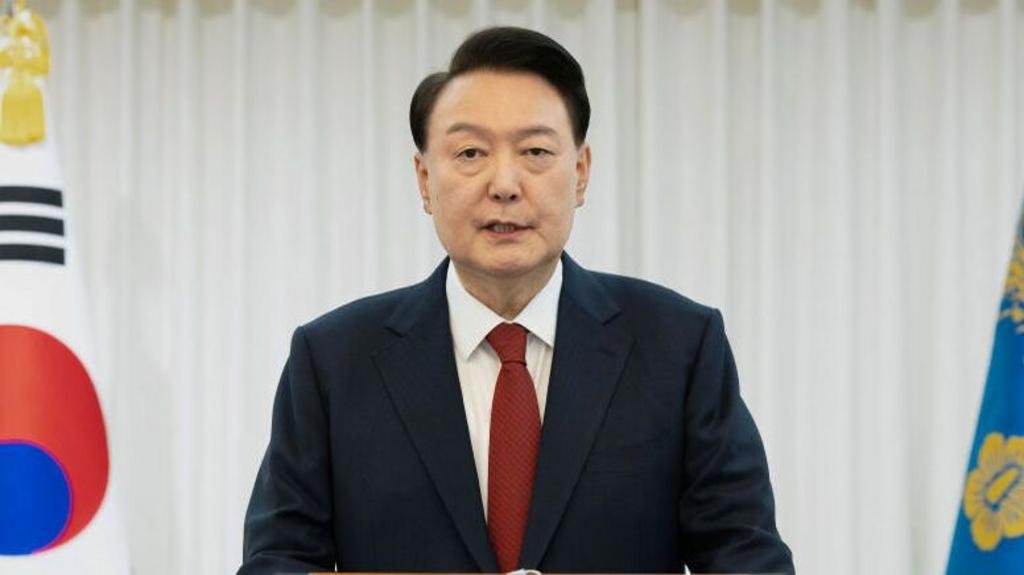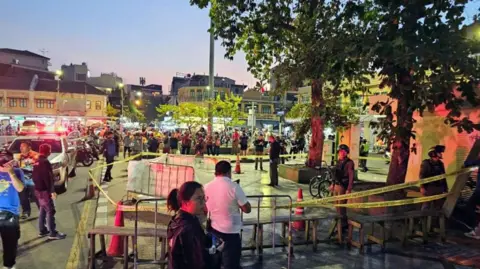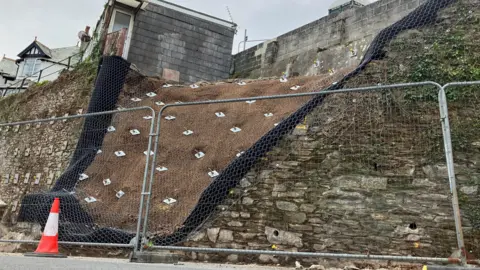-
South Korean authorities have arrested President Yoon Suk Yeol, who faces charges of insurrection following an attempt to impose martial law
-
Yoon is now at the Corruption Investigation Office (CIO) – he said he agreed to the interrogation “even though it is an illegal investigation, in order to prevent any unsavoury bloodshed”
-
Authorities served the warrant after an hours-long standoff with his security staff and supporters, which saw investigators using ladders and wirecutters to enter Yoon’s residence
-
Yoon had been holed up for weeks – investigators tried to arrest him earlier this month but failed
-
This marks the first time in South Korea’s history that a sitting president has been arrested
-
Yoon’s impeachment trial, which will decide if he is removed from office, started yesterday but ended within four minutes because of his absence
Some Chinese supported Yoon’s impeachment – PPP lawmakerspublished at 04:52 Greenwich Mean Time
While South Korea remains locked in political turmoil, Chinese residents in the country have found themselves a talking point among Yoon’s allies.
The ruling People Power Party lawmakers have claimed that ethnic Chinese people are supporting Yoon’s impeachment and attending anti-Yoon rallies.
In response, China has decried these claims and warned its citizens in South Korea to stay away from political gatherings.
“Some politicians from the ruling party are inflating Chinese involvement to deflect domestic attention and pressure from President Yoon’s impeachment,” said Chinese state newspaper the Global Times.
South Korean politics has long been divided in its attitudes towards communist powers
The PPP is seen to take a more hawkish stance on communist powers like China and North Korea , while the Democratic Party is said to take a more pragmatic approach of balancing Chinese and US influence.
How did investigators get to Yoon?
Following investigators’ failed arrest attempt on 3 Jan, Yoon’s security service fortified his compound using barbed wire and buses as barricades.
But investigators and police showed up this morning with the tools to overcome these obstacles: wire cutters and ladders.
They bypassed the parked buses by climbing over them, and cut through barbed wire.
While dozens of ruling party lawmakers formed a human wall in front of the compound to block investigators from reaching Yoon, some managed to get access to the presidential residence through a nearby hiking trail, local media reported.
Anti-corruption agency to question Yoon on insurrection chargespublished at 04:12 Greenwich Mean Time
With President Yoon Suk Yeol now under arrest, all eyes are on the country’s anti-corruption agency.
The Corruption Investigation Office for High-ranking Officials (CIO) will question the embattled president on charges of insurrection and abuse of power, stemming from his controversial martial law decree last month.
Despite the CIO’s historic arrest of a sitting president, however, questions remain about what they will gain from this unprecedented action.
Lawyers representing Yoon previously criticised the execution of arrest warrants issued by the CIO, calling it illegal and invalid. Some have also suggested that Yoon, the former prosecution chief of the country who knows the system well, plans to exercise his right to remain silent during the CIO’s questioning.
Following questioning today, Yoon is expected to be detained at the Seoul Detention Centre in Uiwang, Gyeonggi Province, approximately 5 kilometres from the CIO’s office.
If a court doesn’t issue a detention warrant within 48 hours of Yoon’s arrest, however, he will be released, and free to return to the presidential residence.
Yoon’s party decries his arrestpublished at 03:57 Greenwich Mean Time
Lawmakers from Yoon’s ruling People Power Party (PPP) have decried his arrest as “illegal”, local media reported.
PPP members were among those who gathered outside Yoon’s residence this morning to block investigators.
Kweon Seong-dong, floor leader of the PPP, told parliament he was “regretful” about how the situation unfolded.
“The dignity of our country has been damaged,” he said.
Kweon added that they would hold investigators and police responsible for the injury of a citizen who was hurt during clashes with authorities.
Watch President Yoon’s statement following his arrestpublished at 03:46 Greenwich Mean Time
In a pre-recorded video message released by Yoon’s aides this morning, the suspended president said he stopped holding out against investigators’ attempts to arrest him in order to prevent a violent escalation.
He also maintained that the arrest was illegitimate, though.
“Today, when I saw them invading the security perimeter with fire equipment, I decided to appear before the CIO, even though it is an illegal investigation, in order to prevent any unsavoury bloodshed,” Yoon said.
This video can not be played
To play this video you need to enable JavaScript in your browser.
Media caption,
South Korea: President Yoon addresses nation before his arrest
How Yoon’s martial law order got him herepublished at 03:35 Greenwich Mean Time
For weeks, Yoon and his allies have been grappling with the fallout from his shock martial law declaration on 3 Dec.
Yoon has repeatedly defended the short-lived order, arguing that he was attempting to protect the country’s democracy from North Korea sympathisers. But opposition lawmakers say it was an act of insurrection.
Several top officials have already been arrested over their roles in the martial law order, including military chiefs and ex-defence minister Kim Yong-hyun.
Then, on 14 Dec, the opposition-dominated parliament voted to impeach Yoon – he will be removed from office if the impeachment is upheld by the constitutional court.
Until today, Yoon was defiant in the face of investigations and calls for his resignation. He avoided a first arrest attempt on 3 Jan by holing up in his residence, behind his security service.
Yoon’s replacement as acting president, Han Duck-soo, was also impeached by parliament after refusing to accede to the opposition’s demands.
Han told the National Assembly this morning that while he felt “sorry” for not preventing the martial law order, the legality of Yoon’s move should be judged by the court.
Read more about the thinking behind Yoon’s martial law order.
From the moment of the arrest, the clock started ticking for investigators.
They can now hold Yoon for up to 48 hours, or obtain a detention warrant within this period to detain him while he is investigated. If the court refuses to issue another warrant, Yoon will be released.
In the case of a detention warrant, Yoon can be detained for up to 20 days before being brought to trial.
Once indicted, prosecutors may request that Yoon be tried under detention, which can last up to 6 months.
A nation gripped by uncertaintypublished at 02:57 Greenwich Mean Time
Rachel Lee
Reporting from Seoul
South Korea’s politics, long marked by stark divisions between conservatives and progressives, have descended further into chaos following the recent impeachment and arrest of former President Yoon Suk Yeol.
Yoon is now at the Gwacheon Government Complex where the Corruption Investigation Office (CIO) is located, after a successful second attempt to execute an arrest warrant.
The arrest comes amid allegations of insurrection against Yoon, who declared martial law on 3 Dec.
The ensuing political crisis has intensified tensions between the former president’s supporters, who protested against the CIO’s actions, and his opponents, who celebrated when authorities successfully carried out the arrest.
The contrasting scenes reflected the deepening polarisation in South Korea. While Yoon’s opponents cheered his detention, his supporters vowed to continue their fight, insisting that the arrest marked only the beginning of a protracted struggle.
As the former president faces questioning over the charges, the nation remains gripped by uncertainty, with no clear resolution to the widening political divide.











No comments yet. Be the first to comment!